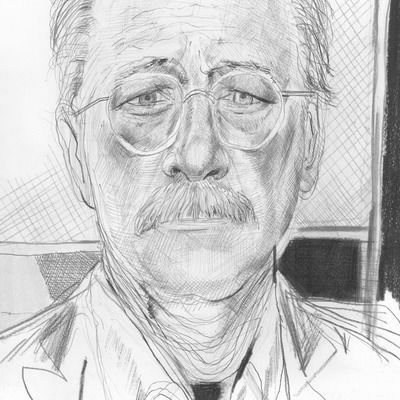
The Storyteller
On the writer W.G. Sebald.

On the writer W.G. Sebald.
Ben Lerner New York Review of Books Oct 2021 Permalink
We stopped at a service station where there were old truck drivers, their vehicles festooned with red banners: “All-out war against the virus, weather hard times together.” The drivers wore their masks down around their chins as they smoked. I asked for water at the only open shop, and the assistant pulled his jacket up to cover his mouth before saying “over there.”
Lavender Au New York Review of Books Mar 2020 15min Permalink
Exploring the dark and far-reaching consequences of our dependence on the Internet.
Tom Scocca New York Review of Books Oct 2020 25min Permalink
On the work of Vivian Gornick.
Dayna Tortorici New York Review of Books Sep 2020 20min Permalink
For a rebellious, Korean-American teen like myself who was awkwardly trying to situate himself, without much success, Jackson’s writing, with its rap and jazz references and its relentless, engaging voice, provided a vision of Black agency that felt almost illicit.
Jay Caspian Kang New York Review of Books Aug 2020 20min Permalink
On the anti-communist genocide known by the Indonesian Army as Operation Annihilation.
On loving and hating and living in Manhattan.
Zadie Smith New York Review of Books Oct 2014 10min Permalink
On young love.
Punitive notions of disease have a long history, and such notions are particularly active with cancer. There is the “fight” or “crusade” against cancer; cancer is the “killer” disease; people who have cancer are “cancer victims.” Ostensibly, the illness is the culprit. But it is also the cancer patient who is made culpable.
An exchange on faith and politics in America.
Barack Obama, Marilynne Robinson New York Review of Books Oct 2015 15min Permalink
“Economic theory as it exists increasingly resembles a shed full of broken tools.”
David Graeber New York Review of Books Nov 2019 20min Permalink
In defense of fiction.
Zadie Smith New York Review of Books Oct 2019 25min Permalink
Another inmate was unable to complete his application, and assented to voluntary departure, in which an immigrant agrees to leave the country at his or her own expense. “You’ll be on your way back to Mexico today,” said the judge.
Madeleine Schwartz New York Review of Books Sep 2019 20min Permalink
An essay from inside Sing Sing.
John J. Lennon New York Review of Books Jul 2019 30min Permalink
What climate change means for kids in New York.
Emily Raboteau New York Review of Books Feb 2019 50min Permalink
On the choices Fred Rogers made.
Robert Sullivan New York Review of Books Jan 2019 15min Permalink
In the wings of this great drama were the unseen. Hidden in the rainforest where the violence was staged, in the eerie aftermath of the tragedy, were three people whose stories cue political contexts in both the US and Guyana crucial to understanding how and why Jonestown may have happened.
Gaiutra Bahadur New York Review of Books Dec 2018 20min Permalink
On Bob Woodward’s “rather eerie aversion to engaging the ramifications of what people say to him.”
Joan Didion New York Review of Books Sep 1996 25min Permalink
On the ubiquity of forest fires.
William Finnegan New York Review of Books Aug 2018 15min Permalink
On the Central Park jogger case.
Joan Didion New York Review of Books Jan 1991 1h Permalink
When New York was perpetually on fire.
Luc Sante New York Review of Books Nov 2003 15min Permalink
On the fallibility of memory.
Oliver Sacks New York Review of Books Jan 2013 15min Permalink
Watching the jazz singer in New York.
Elizabeth Hardwick New York Review of Books Mar 1976 15min Permalink
A dispatch from the Philippine capital, where “no one will be safe until many, many more have died.”
James Fenton New York Review of Books Jan 2017 15min Permalink

Why we must bring trains back.
“The world before the railways appeared so very different from what came afterward and from what we know today because the railways did more than just facilitate travel and thereby change the way the world was seen and depicted. They transformed the very landscape itself.”
“It is simply not possible to envision any conceivable modern, urban-based economy shorn of its subways, its tramways, its light rail and suburban networks, its rail connections, and its intercity links.”
Tony Judt New York Review of Books Dec 2010 – Jan 2011 25min Permalink